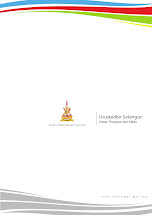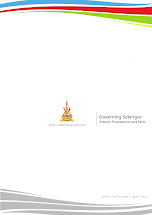Published: Fri, 11 Nov 2011

Lightning strikes during a heavy thunderstorm, causing trees to fall onto the road, obstructing cars driving through and almost injuring residents living in houses nearby. A phone call is then made to the first person that comes to the complainant’s mind – a face they elected two years ago, their Member of Parliament (MP) or assemblyperson.
Regardless of what the complaint is – be it uncollected trash, neighbourhood squabbles or potholes – most residents usually file complaints to politicians, hoping it will be resolved with a snap of the finger.
These residents tend to be unaware that such complaints should be directed to local councillors, they who represent the people’s voice at local councils.
“There is often a misconception of roles by residents on what a councillor should do and what a Member of Parliament should do,” says Klang MP Charles Santiago.
Being an MP, he is expected to prepare for debates in Parliament, be up to date on parliamentary issues, and make laws on a federal level.
However, over the years, MPs have become the person expected to handle anything and everything a resident comes to them with.
“About 50-60% of my daily tasks are handling local council issues like garbage collection and flood woes,” says Santiago.
He even received a threatening note from a resident requesting him to solve crime problems in an area because they voted for him.
“The thing is, I can’t solve that as it’s a police matter, and I can only highlight it to the respective authorities,” he says.
Even so, he never turns a complainant away, but tries to help them by redirecting straightforward complaints to councillors and intervening where it comes to the more complicated matters.
“I usually only step in when residents are finding it hard to negotiate certain matters with authorities, or when both parties can’t see eye to eye on things,” says Santiago. For example, matters like hawker relocations or major infrastructure problems.
However, there is a limit to how far he can help, as MPs have no control over the council’s budget, councillors’ decision-making, or the councils’ operating systems.
Bridging the gap
Meanwhile, councillors who have the power to get matters solved are often not recognised or acknowledged by residents, some of whom don’t even know they exist.
“Being part of the local council has made me realise how some issues could be resolved because we have the power to do so.
But many residents are still unfamiliar with the roles of a councillor,” says Subang Jaya Municipal Councillor (MPSJ) Tan Jo Hann.
The three-term councillor since 2008 explains that the responsibility of a councillor is to act as the bridge or facilitator between residents and the council.
“We organise dialogue sessions with residents and officers to discuss issues and ensure residents get a fair hearing, especially when it is an issue concerning powerful developers,” Tan says.
Councillors are also expected to draw up policies on a local-government level.
“Our role is to act as the highest body in the local council to set new policies and help implement them in the community,” Tan says.
In addition, councillors are placed in different committees within the council to tackle different issues such as infrastructure, finance, environment and audit.
Tan, who sits in the audit committee, environment committee and infrastructure committee, also chairs the cleanliness sub-committee and abandoned-building sub-committee.
It is crucial that councillors are placed in different committees so that they can come up with policies to help solve long-term issues like project development, traffic congestion, and development on slopes.
Motions are made in the respective committees and brought into the council’s monthly full board meeting for the resolution to be passed and approved by the board.
Once approved, the council will move to implement them in the community in a bid to create a more conducive living environment for the people.
Examples of policies set by councillors over the year are a new hostel guideline for houses in MPSJ; one-hour timed parking system at Taipan, USJ; and green-building policies by the Petaling Jaya City Council (MBPJ).
Green buildings, policies and other duties
“We are the first council to manifest the mandatory green-building certification if developers want to get a higher plot ratio,” says MBPJ councillor Derek Fernandez.
The three-term councillor said policies are made by councillors to benefit all parties, especially residents.
Recently, MBPJ approved a policy to invite residents to hear and discuss the council’s budget.
It was the first open budget session that allowed residents to sit in and listen, and voice out their comments or objections regarding the Budget 2012.
Apart from that, MBPJ councillors approved a policy allowing all residents to object or voice out concerns over developments in their neighbourhood.
“Previously, only direct neighbours can make an objection, but now we overwrote the bylaw and extended the opportunity to all residents to have a say,” Derek says.
With the new policy, signage with details about a particular development will be put up at a construction site, and residents can write in to MBPJ with their concerns for the council to try to solve.
Policies can also be made to help earn more revenue for the council, like implementing a rental fee for billboard advertisers, or forming an independent audit committee to monitor council spendings.
“These two policies actually helped the council earn over RM7 million with the billboards, and saved us a few million each year on contract malpractices,” says Derek.
Though the councillors have a handful of policies to draw up and implement, their daily duties don’t end there.
Every day, councillors will be swamped with complaints ranging from general ones like rubbish, drains and floods to sensitive ones like neighbour disputes, house-renovation problems, and licensing issues.
Residents would rather call the councillor to personally address the issue or set up a meeting to see them individually, for fear their problems would fall on deaf ears otherwise.
“They have this mindset that it’s better to complain personally to a councillor in order for their complaints to be addressed and solved faster. They don’t trust the system,” said Hulu Selangor District Councillor (MDHS) Chua Yee Ling.
The two-term councillor said the system, which the council adopted over 50 years ago, has given the residents the perception that their complaints will be left unattended.
“I don’t blame the staff because it’s the system that’s at fault. They are so used to a particular way of doing things that it’s hard to change,” she said.
Chua added that local governments and councillors should think of new approaches and creative means to replace the old ways.
Money matters
However, Chua is unhappy about the small allowance councillors get, which doesn’t justify their huge job scope.
“How can you pay a councillor RM750 and expect them to do their job properly when they have to earn a living and pay bills at the same time?” she asks.
She says with the many issues a councillor needs to focus on and tackle, that amount of money isn’t enough for a full-time councillor.
Before this, Chua and her fellow district councillors were paid RM250 per month. This figure was increased this year by RM500.
The small pay rise raised eyebrows of Selangor MCA deputy chairperson Datuk Teh Kim Poo.
“The raise given to councillors is too quick. Less than two and a half years and the councillors are getting a second increase... it is absurd as the number of them throughout Selangor are inefficient and not service-oriented,” he said.
Agreeing with him was Selangor MCA Public Complaints Bureau chief Datuk Theng Book, who said the allowance was not meant to cover their living expenses.
“A councillor is appointed to serve the people, it is not a full-time job. If you think you cannot survive with the allowance you receive, I advise you not to take the post,” he said.
However, Monash University’s political scientist Wong Chin Huat thinks that councillors should be paid what they deserve, judging on the work they do.
“They should be paid like a middle-level manager but less than an MP and assemblyperson,” Wong says.
He says those paid a higher amount should be a full-time councillor responsible for taking care of daily complaints, supervising site visits and following up on grievances.
Part-time councillors can be paid less and are only expected to do half of what full-time councillors do.
“With one zone in the urban area having a population of about 10,000 to 20,000 people, it is impossible for one councillor to handle the whole lot,” Wong says.
 Selangor Times
Selangor Times
Source : Selangor Times






